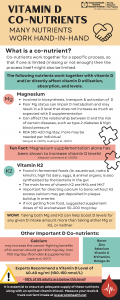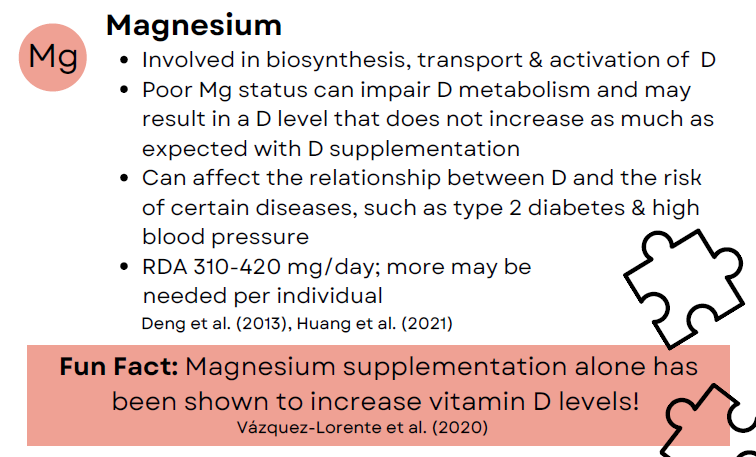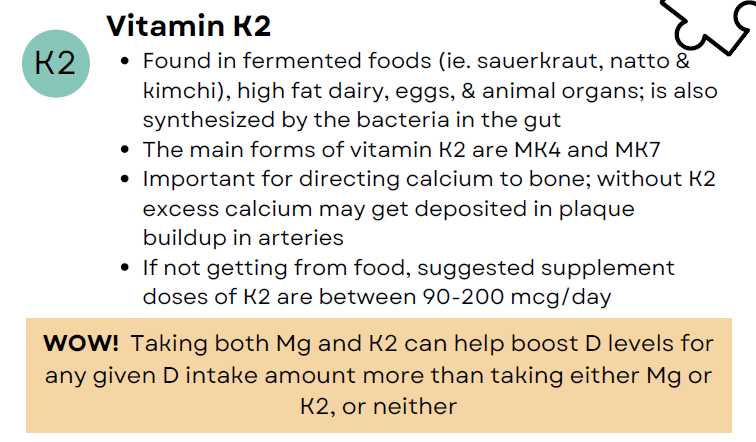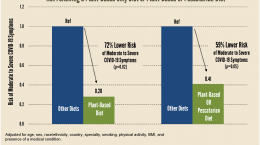Published on January 20, 2023
Now with a new infographic to share! Here are the most important co-nutrients to support our body’s use of vitamin D (and vice versa)
Key Points
- Several key nutrients are especially important to get with vitamin D, because of how they work together for certain processes within the body, and/or affect vitamin D utilization, absorption, and levels
- Magnesium and vitamin K2 have a particularly important relationship with vitamin D, to the point where getting enough or not can affect known disease risks associated with vitamin D
- While it is essential to ensure that your vitamin D serum level is at least between 40-60 ng/ml (100-150 nmol/L) as recommended by vitamin D scientists and experts, it is just as important to make sure you are getting an adequate supply of other nutrients through a healthy, balanced diet and/or supplementation
 Here at GrassrootsHealth, we focus a lot on vitamin D specifically – and while it is an especially important and unique nutrient, and the majority of the population is vitamin D deficient, its importance should not overshadow that of other nutrients our bodies need along with it.
Here at GrassrootsHealth, we focus a lot on vitamin D specifically – and while it is an especially important and unique nutrient, and the majority of the population is vitamin D deficient, its importance should not overshadow that of other nutrients our bodies need along with it.
To highlight several key nutrients that are especially important to get with vitamin D, because of how they work together for certain processes within the body, and/or affect vitamin D utilization, absorption, and levels, we have created this easy-to-share infographic. Remember – it is still essential to ensure that your vitamin D serum level is at least between 40-60 ng/ml (100-150 nmol/L) as recommended by vitamin D scientists and experts, however, it is just as important to make sure you are getting an adequate supply of other nutrients through a healthy, balanced diet and/or supplementation.
Magnesium
Magnesium is an important co-nutrient for vitamin D, and is involved in the biosynthesis, transport, and activation of vitamin D. Magnesium is the fourth most abundant mineral in the human body, however, an estimated 42% of young adults have ongoing magnesium deficiency. This can lead to problems with energy metabolism, muscle function, blood pressure regulation, insulin metabolism, cardiovascular function, nerve transmission, neuromuscular contraction, and more. Here are some key points about magnesium’s relationship with vitamin D.
Read more about the relationship between vitamin D and magnesium here.
Vitamin K2
Vitamin K2 in our diet comes mostly from fermented foods, and from bacteria on foods that produce vitamin K (times before refrigeration). Similar to vitamin D, vitamin K is a fat soluble vitamin that should be taken with a fatty meal, and it plays many roles within the body.
Learn more about the relationship between vitamin D and vitamin K here.
Other Important Vitamin D Co-nutrients Include:
- Calcium – absorbed from the gut with the help of vitamin D, and is crucial for bone health; it also may increase the cancer-fighting benefits of vitamin D; women should get 1200 mg/day, men 900 mg/day (from diet and supplements) (Lappe et al., 2017)
- Boron – helps increase vitamin D activating enzymes vitamin D and is essential to bone health
- Zinc – absorbed from the gut with the help of vitamin D, works along with vitamin D for immune function, and is an important component of vitamin D receptors
- Selenium – works with vitamin D reduce inflammation, improve immune function, and helps activate vitamin D within the cells; both are also involved in glutathione production and status
- Vitamin C and B Vitamins – have been shown to increase the vitamin D level in response to supplemental intake
- Omega-3s – work with vitamin D for immune health, regulating inflammation, and many other functions; both are especially important during pregnancy
Download the Full Infographic Here
How Much More Supplemental Vitamin D was Needed Without Enough of These Co-Nutrients?
Several nutrients seem to especially influence how an individual’s vitamin D level responds to their vitamin D supplementation amount (this is called the dose-response).
The calculations below show how much more supplemental vitamin D was needed, on average, for participants to achieve a vitamin D level of at least 40 ng/ml (100 nmol/L), for those not taking each nutrient in supplement form compared to those taking each nutrient.
- 244% more without taking both magnesium and K2
- 146% more without taking at least 400 mg/day magnesium
- 115% more without taking at least 200 mcg/day vitamin K2
- 14% more without taking at least 500 mg/day calcium
- 63% more without taking at least 20 mg/day vitamin B6
- 61% more without taking at least 500 mcg/day vitamin B12
- 94% more without taking at least 1,000 mg/day vitamin C
- 72% more without taking probiotics
Are You Getting Enough Vitamin D, Magnesium & Other Important Nutrients?
 Having and maintaining healthy vitamin D levels and other nutrient levels can help improve your health now and for your future. Choose which to measure, such as your omega-3s and essential minerals including magnesium and zinc, by creating your custom home test kit today. Take steps to improve the status of each of these measurements to benefit your overall health. You can also track your own intakes, symptoms and results to see what works best for YOU.
Having and maintaining healthy vitamin D levels and other nutrient levels can help improve your health now and for your future. Choose which to measure, such as your omega-3s and essential minerals including magnesium and zinc, by creating your custom home test kit today. Take steps to improve the status of each of these measurements to benefit your overall health. You can also track your own intakes, symptoms and results to see what works best for YOU.
Enroll and test your levels today, learn what steps to take to improve your status of vitamin D (see below) and other nutrients and blood markers, and take action! By enrolling in the GrassrootsHealth projects, you are not only contributing valuable information to everyone, you are also gaining knowledge about how you could improve your own health through measuring and tracking your nutrient status, and educating yourself on how to improve it.







